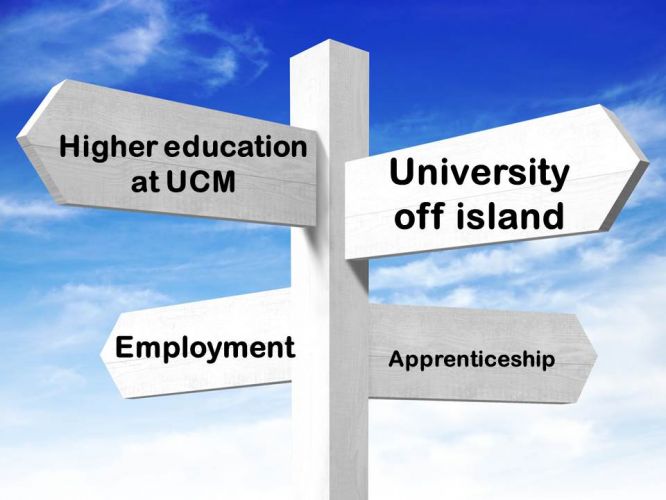If you have completed advanced level 3 qualification the options available to you are likely to be continue with full-time education - usually this means moving on to higher education (HE), e.g. by taking a degree at UCM or at a university across or find a job or Apprenticeship.
You may want to go off island and feel that this will give you more of a ‘student experience’. It is true that learning doesn’t just happen in school, college or university and you will learn a lot just by having to look after yourself at university. You may have other ideas such as working for yourself or take a gap year (but with the latter, at some stage you will still need to decide what to do after your time 'out').
Up to 75% of local students on advanced level courses choose further study at UK universities and colleges. Applications for course places need to be made at the beginning of year 2 of A levels to ensure you gain the course and the place you want. You will have to achieve the A level entry grades or other appropriate qualifications required and ideally have good GCSE grades to back this up. Many universities require grade C or above in specified subjects especially English and Maths.
For full details and to check out the right A levels and qualifications for the degree courses which interest you find out more at what and where to study. The Department of Education Sport & Culture’s minimum requirement for payment of university fees is at least 80 UCAS points. Information on grants towards fees is available from the Department of Education student awards section.
There are selected higher education courses available locally on the Isle of Man at UCM and Keyll Darree. On the other hand if you stay on the island, it is going to be cheaper as currently UCM do not charge fees and you are likely to live at home. If you do go away to university, do you want to live in a city with all the nightlife that this will offer?Or would you prefer a campus with everything you need on site? What else is important to you? As well as the ‘status’ of the university in terms of academic ‘league tables’ you may want to look at some of the alternative guides Push, Complete University Guide and Which.
If you want to travel or gain work experience, either paid or voluntary you can delay entering university for at least a year. Find out more about this option by talking to careers teachers and careers advisers in school or contact the careers service.
If you are 21 (or over) it is not usually sufficient to apply with only GCSEs. Applications from mature students must show evidence of study at a higher level than GCSE or considerable relevant work experience.
Apprenticeship
An apprenticeship or vocational learning means you would be working for an employer, earning a wage, and studying for a qualification (often an NVQ or City and Guilds) at the same time. You could be linked to University college, IOM or a specialist training provider to make sure you get all of your work done for your qualification. Combining practical work experience and training, apprenticeships will enable you to qualify in a wide variety of areas - engineering, construction, catering, hairdressing, information technology, childcare to list a few. This practical way of learning is very popular - ‘get paid as you train’. Some people prefer this option to continuing in education on a full time basis but it is a big commitment and not a decision which can be taken lightly. For more details visit apprenticeships or contact a Careers Adviser and get some advice.
Employment
The job market on the Isle of Man is uncertain at the moment, although not possible to predict, you may find it more difficult to find a job after you leave sixth form. It may be wise to keep your options open through applying for higher level qualifications at UCM – you can always cancel if you change your mind, when you receive your results. Start looking at the job market and the type of vacancies that are being advertised, the qualifications, skills and experience employers are currently looking for. You may notice that employers can often advertise for positions that require certain types of qualifications, experience and specialist skills. You may be successful in gaining a job in the short term but you do need to consider the long term implications of this.
Some professional researchers forecast that whilst the future cannot be entirely predicted more employers will be seeking higher levels of education in the future and qualifications could be considered as a type of ‘insurance’ in ensuring your employability. That said you may find a job with the right employer who offers you the opportunity to train and gain qualifications on the job and be very successful on this pathway. This could be very dependent upon the opportunities that are advertised when you leave school. Employers will advertise vacancies on the JobCentre website start searching this website on a regular basis to see if suitable vacancies are being advertised.
You have to decide what is right for you. Try not to be influenced by what your friends are doing, or what other people are expecting of you. Look into all the options carefully with an open mind, then make your decision. If you would like some useful and free advice from career professionals contact us.

